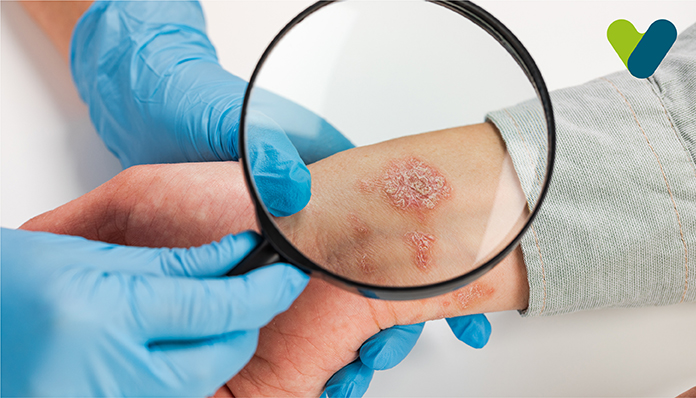Ringworm is also known as dermatophytosis, tinea, or dermatophyte infection. This is a fungal infection of the skin. This fungal infection is known as ringworm as the lesion caused by the infection resembles the shape of a worm in a ring.
It should be noted that ringworm infection can occur in both humans and animals. Initially, the infection appears in the form of red patches on the affected areas of the skin. It later spreads to other parts of the body. One can get ringworm infection on the scalp, feet, nails, beard, groin, and other areas of the body.
This is why it is important for an individual to be familiar with the treatment for ringworm, including ringworm cream and 3-day ringworm treatment. Today, we’ll take you through all of this and more things related to ringworm infection.
Symptoms of Ringworm
Recognizing that you are suffering from ringworm infection is a big step in getting the right ringworm medicine. This is why we will first take you through the symptoms that one can experience if he or she is suffering from ringworm. These symptoms are mentioned below.- Patches that develop pustules or blisters
- Patches that have defined and raised edges
- Patches that appear redder on the outside edges or resemble a ring
- Red, itchy, and scaly patches
- Raised areas of the skin, which are also known as plaques
- Thicker or discoloured nails
- Nails that are beginning to crack, which is also known as dermatophytic onychomycosis or tinea unguium
- Your hair may break, fall off, or bald patches might develop. This condition is known as tinea capitis
The Causes of Ringworm
Now that you are familiar with the symptoms of ringworm, the next step is to learn about the possible causes of ringworm. There are different types of fungi that can cause ringworm. These three types of fungi are:- Trichophyton
- Microsporum
- Epidermophyton
It should be noted that ringworm is usually spread through contact in children and by sharing items that contain these fungi. Further, the name for the medical condition can also differ depending on the type of fungi that has caused ringworm.
For example, the ringworm of the scalp is known as tinea capitis. It often starts as isolated scaling in the scalp and eventually develops into itchy and scaly bald patches. It is very common among children.
The ringworm of the body is known as tinea corporis and it often appears as round ring shape patches. These patches are characteristic of this condition. The ringworm infection of the skin around the groin is known as tinea cruris or the jock itch. This infection can also occur on the inner thighs and buttocks. It is quite common in adolescent boys and men.
The ringworm infection of the foot is known as tinea pedis or the athlete’s foot. It is frequently seen in people who go barefoot into public places like locker rooms, showers, and swimming pools.
Diagnosis of Ringworm
Diagnosing ringworm correctly is important in getting the right treatment for the condition. Doctors usually diagnose ringworm by examining the skin and using a black light to view the skin of the infected area. Depending on the type of fungus, the skin might glow or fluoresce under the black light.Your doctor might also request you to get some tests done for diagnosing ringworm, including:
- A skin biopsy or fungal culture during which the doctor will take a sample of your skin or discharge from a blister. This sample is sent to the lab for testing for the presence of the fungus
- A KOH exam during which the doctor will scrape off a small area of the infected skin onto a slide. After that, he or she will place a few drops of a liquid called potassium hydroxide or KOH on it. The KOH will break the normal skin cells apart and make it easier for the doctor to see the fungal elements under the microscope
Treatment of Ringworm
For properly treating ringworm, your doctor might recommend some medications and lifestyle changes. Let’s look at the medications first. Usually, depending on the severity of the ringworm infection, the doctor might prescribe several medications.For example, antifungal creams, gels, ointments, and sprays can be used for treating ringworm of the body, athlete’s foot, and jock itch. Oral medications like terbinafine and griseofulvin (Gris-PEG) might be prescribed for treating ringworm of the scalp or nails.
Beyond this, the doctor might also recommend some over-the-counter (OTC) medications and antifungal skin creams. These OTC medications usually contain clotrimazole, terbinafine, miconazole, and other related ingredients.
When it comes to lifestyle adjustments, then patients can follow the tips mentioned below to treat ringworm.
- Wash your bedding and clothes daily during an infection. This will help in disinfecting your surroundings
- Dry your body thoroughly after bathing
- Wear loose clothing in the affected area
- Treat all infected areas
- Apple Cider Vinegar
- Coconut Oil
- Turmeric
Many people find these home remedies effective in treating ringworms. However, if you are suffering from this condition, then you should always contact a doctor and get professional medical help.
